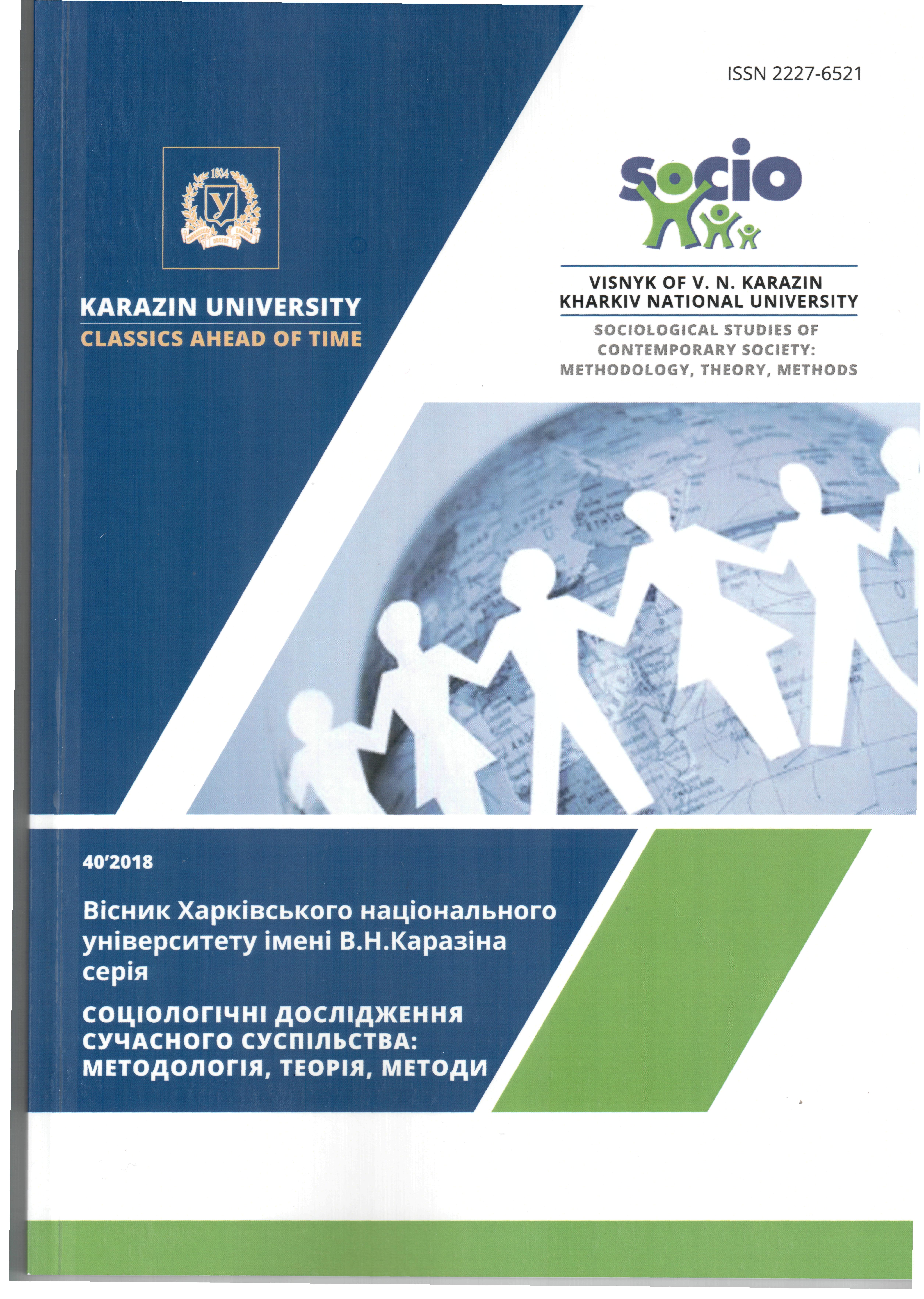Religious Freedom as a Factor of Religious Pluralism: Theoretical Explanations
Abstract
The article defines the features of contemporary discourse in the sociology of religion, in particular the peculiarities of the theory of religious economy. Religious freedom has been characterized as a key factor in religious pluralism. It is stated that the degree of freedom of the religious market influences pluralism: the less regulated the market, the more pluralism thrives. It is determined that religious organizations that have reached a certain level of monopoly will try to put their efforts in the direction of influence on all other institutions and, thus, society will be «sacred». The factors influencing the development of religious organizations are analyzed. The first factor is that governments and other institutional constraints can prevent certain groups from developing or even begin to operate. The four main types (types) of state regulation of religion are considered: religious prohibition, religious monopoly, religious oligopoly and religious pluralism. The second factor influencing religious organizations is the cost of launching new religious organizations that are nonlinear and dependent on the degree of regulation of the religious economy. The third factor is cultural inertia (tradition), which can delay the adoption of new firms as a legitimate phenomenon. The fourth factor influencing the development of religious organizations is the significant transformation in the size and composition of the population, due to migration (internal and external) and general population growth
Downloads
References
Каргина И. Г. Социологические рефлексии современного религиозного плюрализма : монография. Моск. гос. ин-т междунар. отношений (ун-т) МИД России, каф. социологии. М. : МГИМО-Университет, 2014. 278 с.
Stark R., Bainbridge W. The Future of Religion. Berkeley, CA: University of California Press, 1985.
Stark R., Bainbridge W. The Theory of Religion. New York: Peter Lang, 1987.
Бовгиря І. В. Релігійні зміни у Східній Європі наприкінці ХХ століття крізь призму теорій секуляризації та релігійної економіки. Наукові записки НаУКМА. Том 174, Соціологічні науки. Національний університет «Києво-Могилянська академія». К.: ВПЦ НаУКМА, 2015. С. 55–61.
Вовк І. А. Економіка і християнська релігія: проблеми і напрями дослідження. Вісн. нац. ун-ту «Юрид. акад. України ім. Ярослава Мудрого». Серія: Економічна теорія та право : зб. наук. пр. Нац. ун-т «Юрид. акад. України ім. Ярослава Мудрого». Х. : Право, 2013. № 4 (15). С. 98–104.
Гаврілова Н., Кисельов О. Релігійність української молоді: раціональний вибір чи спонтанний крок? URL: http://www.religion.in.ua/10564-religijnist-ukrayinskoyi-molodi-racionalnij-vibir-chi-spontannij-krok.html
Калениченко Т. Застосування теорії раціонального вибору до аналізу подій в Україні 2013–2016 рр. СХІД. 2016. № 1 (141). С. 69–72.
Тимчик О. А. Економіка та релігія: теорія і практика взаємовпливу : монографія. К. : КНТ, 2014. 410 с.
Халіков Р. Х. Дискурс про секуляризацію в постсекулярному суспільстві. Роль науки, релігії та суспільства у формуванні моральної особистості: матеріали ХХХ міжнародної науково-практичної конференції. Донецьк : ІПШІ «Наука і освіта», 2011. С. 92-95.
Шоріна Т. Г. Теорія раціонального вибору в сучасному релігієзнавстві: приклад позитивістського та міждисциплінарного підходів. Вісник Національного авіаційного університету. Серія: Філософія, Культурологія. 2013. № 2. С. 76–81.
Белькова А. Отношения государства и церкви в теории религиозной экономики. Государство. Религия. Церковь. 2013. № 3. С. 178–198.
Зарецкий А. Д. «Религиозная экономика» в современном мире. Journal of Economic Regulation (Вопросы регулирования экономики), 2011. № 1. Том 2. С. 5–14.
Опалев С. А. Критика теории секуляризации в теории рационального выбора. Религиоведческие исследования. М.: Издатель Воробьев А. В. 2010. № 3-4. С. 170-189.
Руткевич Е. Д. «Новая парадигма» в социологии религии: Pro et Contra. Вестник ИС РАН. 2012. № 6. С. 208-233.
Сафронов Р. Современные социологические теории религии в США и Европе. Религиоведческие исследования. 2009. № 1-2. С. 24-44.
Синелина Ю. Религия в современном мире. URL: http://expert.ru/expert/2013/01/religiya-v-sovremennom-mire/
Филькина А. В. Методология изучения современных религиозных феноменов: постановка проблемы. Вестник ТГПУ. 2012. № 2. С. 111–115.
Bankston III, Carl L., Jun 2002, Rationality, Choice and the Religious Economy, Review of Religious Research; Vol. 43, Issue 4. Р. 311-325.
Finke R., Stark R. The Churching America, 1776-1990: Winners and Losers in Our Religious Economy. New Brunswick, NY: Rutgers University Press, 1992.
Iannaccone L., Finke R., Stark R. Deregulating religion: The Economics of Church and State. Economic Inquiry. 1997. 35(2). P. 350-364.
Lechner F. J. Rational Choice and Religious Economies. Sage Handbook of the Sociology of Religion, 2006. 22. Stark R., Iannaccone L. A supply-side reinterpretation of the «Secularization of Europe». Journal for the Scientific Study of Religion, 1994. № 33.
Stark R. Rational Choice Proposition About Religious Movements. Handbook on Cults and Sects. Greenwich, CT: JAI Press, 1993.
Hannan M., Freeman J. The Population Ecology of Organizations. American Journal of Sociology. 1977. Vol. 82. № 5.
Finke R., Scheitle C. Pluralism as Outcome: The Ecology of Religious Resources, Suppliers, and Consumers // Interdisciplinary Journal of Research on Religion. 2009. Volume 5. Р. 12-18.
Яремчук С. Стан і динаміка релігійної мережі незалежної України. ГРАНІ. Науково-теоретичний альманах. Дніпро: Дніпропетровський нац. ун-т імені Олеся Гончара, Центр соціально-політичних досліджень, 2016. № 9 (137). С. 52-59.
Yang, F. Oligopoly Is Not Pluralism. Religious Pluralism: Framing Religious Diversity in the Contemporary World. G. Giordan and E. Pace (eds.). New York: Springer, 2014.
Davie. G. The Sociology of Religion: A Critical Agenda. London: SAGE Publication Ltd. 2013.
Cross-National Data: Religion Indexes, Religious Adherents, and Other Data. URL: http://www.thearda.com
Finke R., Stark R. The Dynamics of Religious Economies. Handbook of the Sociology Religion. Cambridge, NY: Cambridge University Press, 2003.





